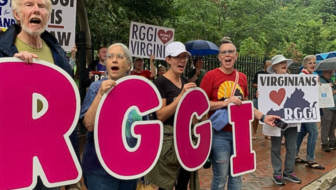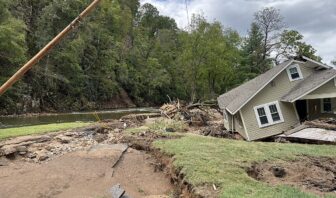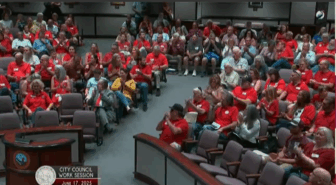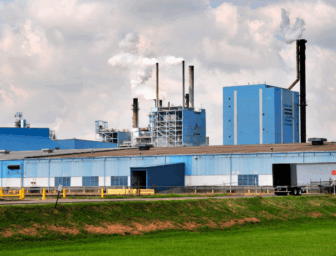CONTACT:
Dawone Robinson, 804-767-8983, dawone@chesapeakeclimate.org
Kelly Trout, 240-396-2022, kelly@chesapeakeclimate.org
Real leadership must involve real action on VA’s coastal flooding crisis
This week, Governor McAuliffe is expected to focus on his energy agenda in Virginia. But it remains to be seen if this week of energy action adds up to the real leadership Virginia needs on climate change.
As Pope Francis reminded us last week, “courageous” action is needed to “redirect our steps” and protect our common home. As the latest images of flooded streets and sidewalks in Hampton Roads remind us, Virginia has no time to lose. The homes of tens of thousands of Virginians, businesses, and vital military infrastructure are at risk now from rising sea levels driven by fossil fuel pollution. A massive, coordinated investment is needed now to keep 1.7 million coastal citizens safe and dry.
These are the top three ways we’ll be looking for Governor McAuliffe’s “energy action” to translate into real climate action this week:
1. Will Gov. McAuliffe’s “energy action” bring real resources to Virginia communities on the front lines of climate change now?
Of the flooding crisis in Hampton Roads, Gov. McAuliffe said in July 2014, “We can’t bury our head in the sand anymore.” However, Gov. McAuliffe has yet to bring meaningful solutions to the massive challenge localities face in funding sea level rise and flood-protection measures.
A bipartisan, win-win solution is gaining momentum: joining the nine-state Regional Greenhouse Gas Initiative, or RGGI. This proven, market-based program would lower emissions from power plants in Virginia while generating about $200 million annually through 2030 in new state revenue, providing a dedicated source of funding for adaptation measures. The Virginia Coastal Protection Act — state legislation that would commit Virginia to joining RGGI and dedicate half of the funds to coastal adaptation efforts — has the support of a growing, bipartisan coalition of city governments, state legislators, low-income advocates, and health, social justice and environmental groups. Gov. McAuliffe’s administration could be laying the groundwork to move Virginia into RGGI. Will he step up and embrace this solution?
2. Will Gov. McAuliffe leverage the Clean Power Plan as a springboard for comprehensive clean energy and adaptation action?
The federal Clean Power Plan sets a new minimum requirement for Virginia to reduce greenhouse gas pollution, a requirement that Virginia is already well on its way to achieving. Gov. McAuliffe must go above and beyond. He must leverage the Clean Power Plan in a way that responds to Virginia’s biggest climate challenges: an overreliance on fracked gas — at the expense of energy efficiency and clean energy investments — and an urgent need for coastal adaptation funding.
On both counts, the Regional Greenhouse Gas Initiative again rises to the top as a win-win solution. By setting a declining cap on carbon emissions, the RGGI program would incentivize investments in Virginia’s clean energy economy instead of new fossil fuels. Investing RGGI revenue in new energy efficiency programs (in addition to coastal adaptation measures) would lower Virginians’ utility bills while eliminating the need for costly new gas-fired power plants. Will Gov. McAuliffe embrace action that goes above the bare minimum of the Clean Power Plan, mobilizing money for our coast and moving Virginia beyond fracked gas?
3. Will Gov. McAuliffe stop endorsing action that makes climate change worse?
During his time in office, Gov. McAuliffe has taken several major positions that move Virginia in the wrong direction on energy. Massive new pipelines for fracked gas, including the Atlantic Coast and Mountain Valley Pipelines, would lock Virginia into decades of more reliance on fossil fuels while putting our communities at risk. A growing number of studies show reliance on fracked gas is just as harmful to the climate as coal. Methane that leaks from fracking wells, pipelines, and gas processing facilities is 86 times more powerful a greenhouse gas than carbon dioxide over a 20-year period.
Paving the way for new investments in dirty fossil fuels is the exact opposite of climate leadership, especially when Virginia has vast, untapped resources of solar, wind and energy efficiency waiting to be developed. Will Gov. McAuliffe use this energy action week to refocus 100% of his attention on making Virginia a true leader on clean, renewable energy development?
RESOURCES FOR MORE INFORMATION:
- Fact sheet on RGGI’s benefits to Virginia: http://chesapeakeclimate.org/wp-content/uploads/2014/03/VA-RGGI-Fact-Sheet-UPDATED-8.10.15.pdf
- Analysis Group study on the economic and consumer benefits of the RGGI program: http://www.analysisgroup.com/uploadedfiles/content/insights/publishing/analysis_group_rggi_report_july_2015.pdf
- Washington Post op-ed by CCAN director Mike Tidwell on Gov. McAuliffe’s climate legacy: https://www.washingtonpost.com/opinions/protect-norfolk-from-drowning/2015/08/14/86d2aa68-4102-11e5-8ab4-c73967a143d3_story.html
- See stories of Virginians on the front lines of rising sea levels: http://floodofvoices.tumblr.com/
###




